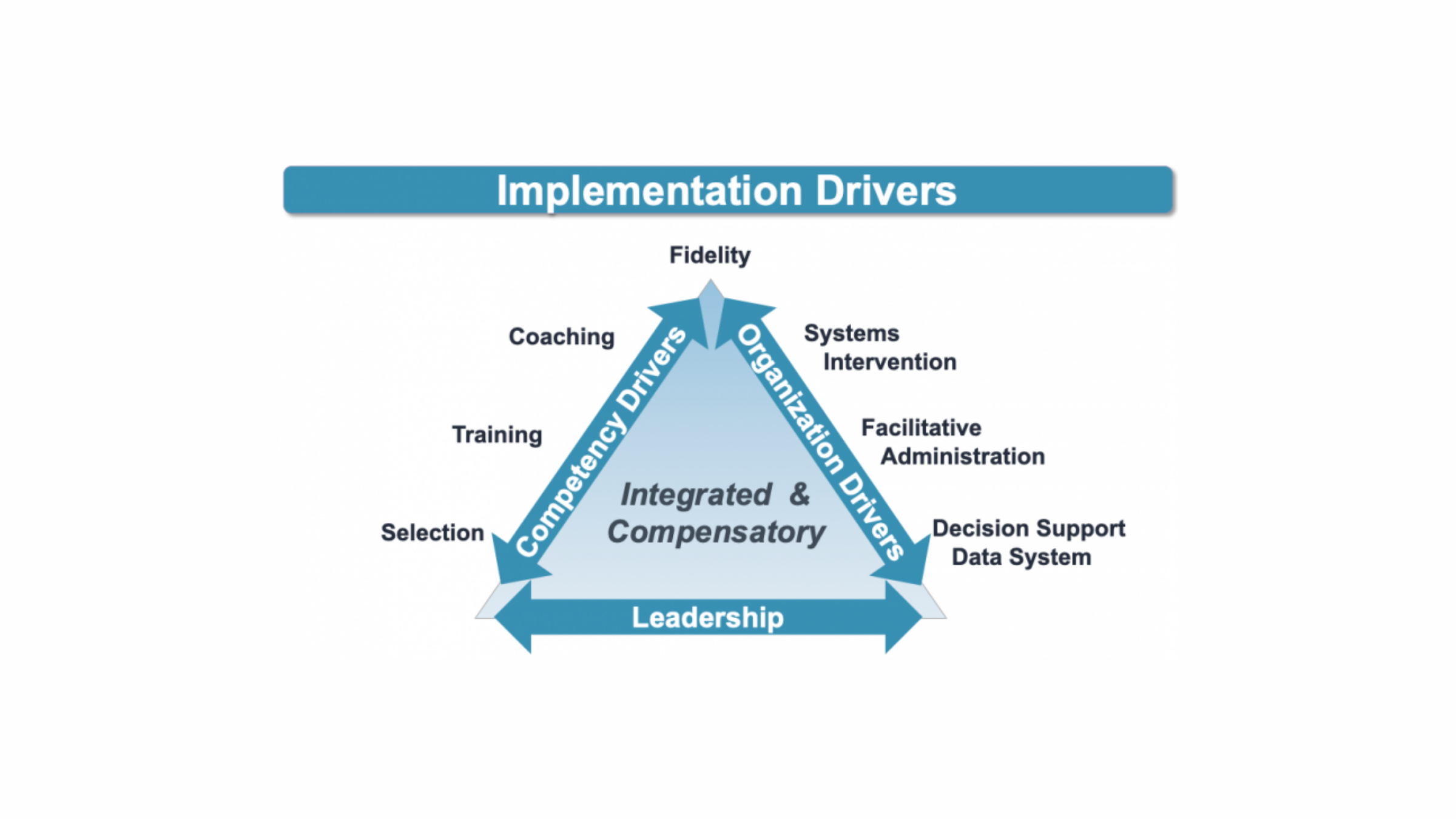SISEP Active State
Targeted Assistance

Michigan Department of Education
Mission: Michigan's mission is to Support Learning and Learners.
Vision: Michigan's vision is Every learner in Michigan’s public schools will have an inspiring, engaging, and caring learning environment that fosters creative and critical thinkers who believe in their ability to positively influence Michigan and the world beyond.
The goal of the partnership with SISEP is to develop the skills and ability of the MDE to use implementation and improvement science practices in the MDE’s efforts to build an effective infrastructure that supports the use of an instructional or leadership practice resulting in improved outcomes for students with disabilities. The partnership was established in March 2016.


Michigan Teaming Structure
Executive Sponsors of SISEP Partnership:
- Dr. Sue Carnell; Chief Deputy Superintendent
State Transformation Assistant Administrator:

Elizabeth Newell Ed.S., LPC, CTSState TransformationAssistant Administrator
Elizabeth Newell Ed.S., LPC, CTSState TransformationAssistant Administrator
Elizabeth leads a series of linked teams that ensure coordination and oversight of MDE’s efforts to support capacity development within intermediate school districts (regional partners) and local education agencies through Coordinated Supports. Such state efforts include systemic support to apply implementation and continuous improvement sciences for effective practices within a Multi-Tiered System of Supports (MTSS) to meet the comprehensive needs of all learners and improve outcomes across Michigan.
SISEP Implementation Specialist:

Associate Director of Education and Measurement for the National Implementation Research Network (NIRN) at Frank Porter Graham Child Development Institute at The University of North Carolina at Chapel Hill. Dr. Ward provides intensive, and informed implementation supports to state and local education systems nationally through her work as the co-director of the State Implementation and Scaling-up of Evidence-based Practices Center, Center on School Turnaround, and National Center for Early Childhood Development, Teaching, and Learning.
Michigan has developed a series of linked teams to support the development of implementation capacity within the MDE and with their partner regional and local education agencies and improve outcomes for Michigan’s learners.
MiMTSS Leadership Team - One of the MDE coordinated supports to Intermediate School Districts (ISDs) and local districts is MTSS support. To ensure cross-office cohesion, the MTSS Leadership Team was established to coordinate and oversee MDE’s effort to support educators’ effective implementation of MTSS and develop local capacity to sustain and scale up an MTSS framework. Collectively, the team will seek solutions and opportunities to strengthen MDE’s MiMTSS. For example, tackling the challenge of building implementation capacity across the educational cascade (state, ISD, district, school, classroom), including ISDs with timely achievement of student outcomes.


Michigan's Approach
Guided by the work of the Transformation Zone, the Michigan Department of Education has focused internally on its systems and processes to improve capacity building with the MTSS Framework. In addition, there was a recognized need to align multiple projects and supports to ensure cohesiveness for all districts.
Michigan Transformation Zone: The Michigan Department of Education developed a transformation zone in 2016, forming a partnership with Intermediate School Districts of Ingham, Lenawee, and Saginaw. With support from SISEP, Michigan set out to build an implementation infrastructure to support the effective use of Multi-Tiered System of Supports (MTSS).
For more information on the Michigan Transformation Zone, visit the site below:
MDE Way of Work (WoW) - To support learners and learning, MDE continues to develop and implement consistent and cohesive work processes across the department through WoW. The intention of WoW is to help align MDE resources, guide decision-making, and explore the fit of additional ideas or projects that support MDE’s vision to become a Top 10 education state. Eight consideration areas (Governance, Defined Effort, Communication, Professional Learning, Technical Assistance, Resources, Data, and Evaluation) build the WoW system and are responsible for designing, developing, and testing processes, procedures, protocols, and tools within their consideration area. A new initiative currently being supported by WoW is the System of Coordinated Supports.

MDE System of Coordinated Supports - To best serve schools/local districts that have been identified for support through the federally approved accountability systems, MDE will quantify needed supports and coordinate MDE’s efforts to meet those needs. This coordinated approach is designed to provide resources to these districts to improve learner outcomes. The system of Coordinated Supports includes a teaming structure for governance, development, and implementation. Three initial components of the system are being developed to increase the department’s ability to effectively coordinate support to districts: data coordination and utilization, the MDE catalog of supports, and district profiles for customer relations management.


Michigan's Focus
While the Michigan Department of Education recognizes that the MTSS Framework is not an evidence-based strategy, the work to develop a consistent framework in the state had to be completed first before a focus area could be selected.
Evidence-Based Practice: MTSS with a focus on Data-Based Individualization within K-3 Literacy
"The MDE MTSS Practice Profile clearly defines standards or expectations for what MTSS looks like in practice and provides guidance for implementation of MTSS as indicated in Michigan’s state law. It describes specifically what actions educators and leaders take when using an MTSS framework as intended. The tool identifies the five essential components of MTSS as well as its underlying philosophy, expected outcomes, and research base."
MTSS Practice Profile Brief - This brief highlights how the Michigan Department of Education (MDE) engaged systematically and purposefully in the practice profile development process to clearly define Multi-Tiered System of Supports (MTSS), a research-based framework that attends to the academic and behavioral needs of students.
For more information on MiMTSS, visit the website below:


Michigan's Current Journey
The current status of Michigan's journey is focused on developing collaborations and alignment to ensure implementation of the MTSS Framework.
Stage of Implementation: Initial Implementation
To assist with implementation efforts, the Michigan Department of Education works within a direct partnership between districts and Michigan’s Multi-Tiered System of Support Technical Assistance Center (MiMTSS TA Center). Schools in these districts access a multi-year professional learning series. Within 1.5 years, school teams have learned how to install the Tier 1 components of an integrated behavior and reading MTSS framework. Districts can expand MTSS implementation efforts to include Data-Based Individualization (DBI), a process for using data in an ongoing way to meaningfully intensify reading intervention instruction.
MiMTSS Technical Assistance Center - MDE’s MiMTSS TA Center plays a vital role in improving outcomes for all learners by assisting educators in developing infrastructures to support high-quality and sustained implementation of effective, data-driven practices within an MTSS framework. The MiMTSS TA Center provides professional learning and technical assistance to educators in ISDs, local districts, and schools to support implementation of EBPs in an MTSS with fidelity. The coordinated and aligned technical assistance delivery structure for MiMTSS through MDE will focus on (1) developing local implementation capacity; (2) enhancing the implementation fidelity of effective practices; (3) producing meaningful student outcomes; and (4) evaluating the effectiveness of the MTSS implementation model and identify additional infrastructure needs.
COVID19 Impact - During the COVID19 Pandemic, the reliability of assessment data became a challenge. While assessment protocols were followed to the best of the district's ability, the sheer nature of events leads to a question about fidelity. To assist with this challenge, the MiMTSS TA Center developed several strategies to impact the SiMR. Mitigation strategies included:
- creating resources to support districts/schools in providing effective instruction during remote learning.
- conceptualizing resources to guide districts/schools on assessing students during remote instruction.
- developing an intensifying literacy instruction guide for educators and leaders.
Transformation Zone Final Report: This report provides a brief description of the MTSS implementation efforts. Michigan provides a description of lessons learned, an overview of capacity growth (see below), and the positive results of collaboration with regional agencies.
"The experiences of MDE and ISDs make it clear that the journey of transformation is difficult work and requires planning and a dedication to implementation."
Michigan State Capacity Data






Michigan's Next Steps
Michigan is moving into the critical next steps of aligning multiple projects and supports. The Michigan Integrated Continuous Improvement Process takes the work of the Transformation Zone, WoW, and coordinated supports to the next level.
Next Steps - The Michigan Department of Education has prioritized aligning and developing a systemic infrastructure to support district implementation of the MTSS Framework. After completing their most recent SCA, MDE identified three critical components: communications, professional learning, and the use of data for informed decision-making.
MDE WoW - The Michigan Department of Education will be focusing their improvements on infrastructure through the WoW process. Specifically, there will be a greater focus on coordinated efforts of support for MTSS implementation through the lens of communications, professional learning, and the use of data.
Coordinated Supports - In addition to their partnership with the MiMTSS Technical Assistance Center, MDE will be moving forward with the alignment of the Michigan Integrated Continous Improvement Process (MiCIP) and technical assistance provided by the Blueprint (Statewide support for low performing schools). By aligning this work to the MTSS Framework, MDE will increase its capacity to meet the needs of the 52 Intermediate School Districts and their subsequent districts.
To learn more about how the Michigan Department of Education has embedded Implementation Science into its continuous improvement process, visit the site below:




